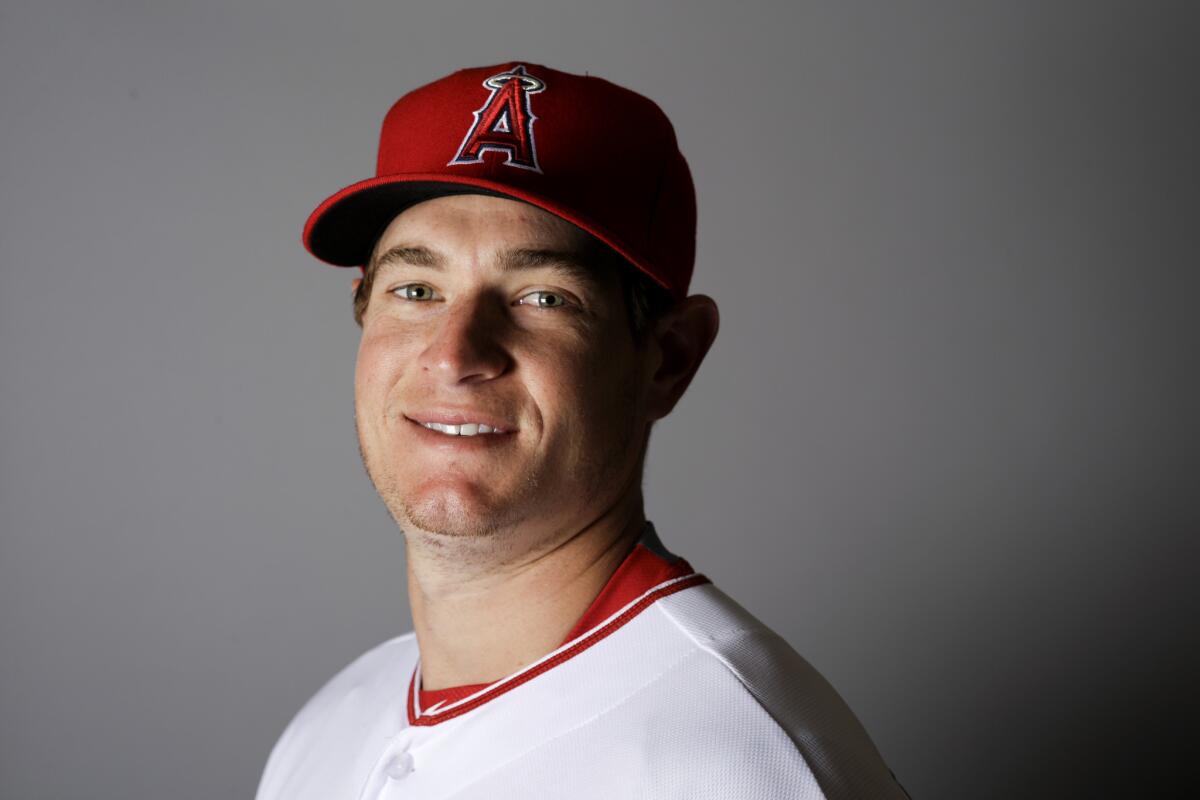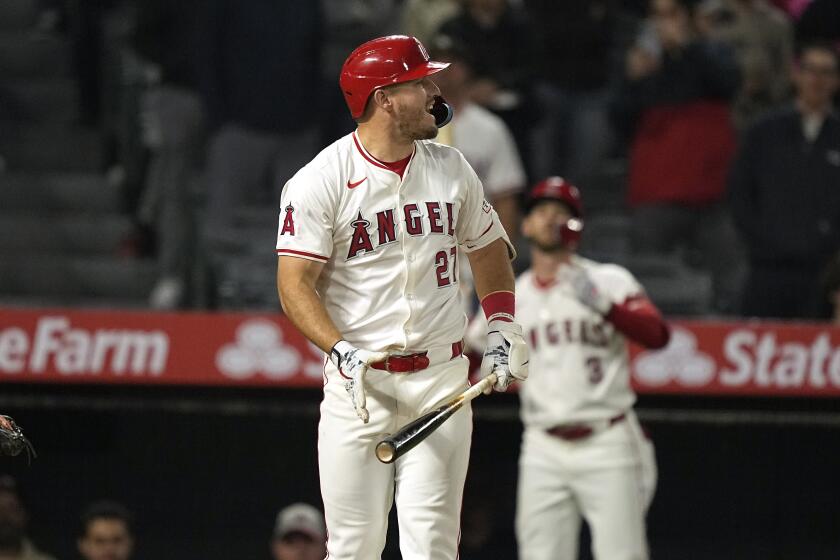Angels saw potential in Garrett Richards, who is more than living up to it

Angels starting pitcher Garrett Richards poses for a portrait during spring training.
Eddie Bane rose from his seat after three innings at Oklahoma City’s Bricktown Ballpark and headed for the exits. He had seen enough of Garrett Richards, the University of Oklahoma junior right-hander who was approaching 100 mph with his fastball and breezing through Missouri’s lineup.
“Let’s go,” he told Angels area scout Arnold Brathwaite. “This guy ain’t gonna be there when we’re picking.”
Scouts in attendance were unsure of Bane’s seriousness. Then the Angels scouting director, the former big league left-hander had a reputation for unfiltered, stream-of-consciousness speech.
“I’m kind of a loudmouth,” he said. “I’ll say anything.”
That was May 23, 2009. The MLB draft loomed in less than three weeks. The Angels would choose four times in the first 42 picks, in what would become regarded as the best draft of the aughts by any team.
With the 24th and 25th picks, the Angels took two highly regarded high school outfielders, Randal Grichuk and Mike Trout. With the 40th selection, they drafted Tyler Skaggs, then a tall, projectable left-hander who had dominated the competition at Santa Monica High. And, at No. 42, they took Richards, who was awful for three consecutive college seasons.
His 6.00 earned-run average his junior year was his best. After he had a 6.97 ERA as a sophomore, striking out 18 and walking 17 as a reliever, Richards contemplated quitting baseball and pursuing culinary school until he rediscovered his feelings for the sport that summer in Alaska.
Still, he described his pitching philosophy as a junior as “Grip it and rip it, man.”
“I literally was just trying to throw the ball over the white thing,” Richards said.
Now, as the 27-year-old Richards readies to take the mound for the Angels’ season opener against the Chicago Cubs on Monday at 7 p.m., he is much more than that. And if the Angels are to contend this season, there is a good chance it will be because of Richards. Of all their players, he offers the best chance to exceed expectations.
Most scouts agree Richards can be an ace. He still regularly approaches 100 and throws the darting slider he did then, and displays a curveball and a cutter as well as a changeup he developed this spring.
“I love that scouts can look past the [expletive] and see that we can turn this guy into something,” Richards said. “That’s the beauty of it. You see this kid into the future. Not what he is right now, but what you see him being. The projectability is, I think, the most important part. A kid could be unbelievable in college and he gets to the minor leagues and sucks. A guy could be super average in college and then puts in a [lot] of work and becomes a premium player.”
“That’s what I love about baseball.”
Brathwaite briefly scouted Richards as a sophomore, then watched him several times in 2009. He believed Richards had all the necessary traits to succeed: size, velocity, an uncomplicated delivery, and a general ease of action.
Come draft day, the Angels ranked Skaggs and Richards similarly. When both remained available at pick No. 40, they took Skaggs first because they received word Arizona would take him at No. 41.
The day after, Brathwaite went to Richards’ house in the Oklahoma City suburb of Edmond. Your success is from here forward all up to you, and how much you want it, he told the pitcher.
“I think he wanted to prove to people he was good,” Brathwaite said. “He was overlooked, overshadowed.”
Richards performed well in the minor leagues, executing a “steady climb” to the majors, as Bane said, while Trout became Trout and the Angels traded Grichuk and Skaggs.
The Angels fired Bane the next year, in a move that remains puzzling considering his 2009 success rate. He is now Boston’s special assistant on player personnel, and still looks back on the pick as a windfall.
“I believe in analytics and all that stuff as much as the next guy, even though my reputation doesn’t say that,” Bane said. “I just couldn’t see any reason that he wasn’t winning. Some other people did, I don’t understand it to this day, and I still don’t care. But that’s a cautionary tale right there, if you’re just going by the numbers. That’s when you make sure you’re not looking at the stats and you’re not talking yourself out of what you saw.”
Bane saw Richards pitch only once. But, based on Brathwaite’s reports and those three innings, and his understanding of the pitcher’s makeup — confident and insistent with a twinge of irreverence — he licensed the selection.
“I don’t know if it’s challenging authority or whatever it is, but it works,” Bane said.
More to Read
Go beyond the scoreboard
Get the latest on L.A.'s teams in the daily Sports Report newsletter.
You may occasionally receive promotional content from the Los Angeles Times.





